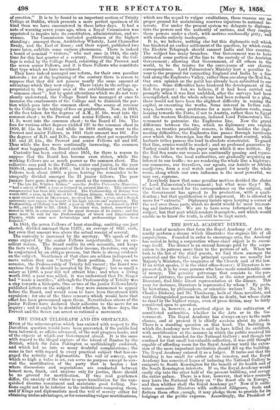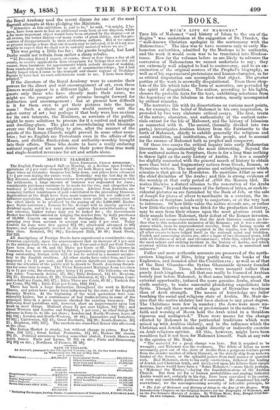THE ROYAL ACADEMY DaNER.
THE knot of members that form the Royal Academy of Arts an- nually perform a drama which illustrates the organic life of all corporations. Founded in order to encourage arts, the Academy has ended in being a corporation whose chief object is to encou- rage itself. The dinner is an annual homage paid by the corpo- ration to its patrons more than. to the patrons of art. When we look to the list of the chief guests, we find them amongst the powerful and the titled ; the principal speakers are usually her Majesty's Ministers, the magnates of the Church and of the law. If an artist speaks, it is the chief office-bearer ; if literature is re- presented, it is by some persons who have made considerable sums of money. The genuine patronage that consists in the pur- chase of pictures, the profession itself, or the sister profession of literature, find little direct representation at the dinner. This year for instance, literature is represented by whom ? By poets, by historians, by philosophers, or scientific writers ? No, by Mr. Charles Dickens, and Mr. Thackeray, both of them novelists, and very distinguished persons in that line no doubt, but whose claim to stand in the highest range, even of prose fiction, may be fairly considered open to question.
There is, however, a practical object in this cultivation of constituted authorities, whether in the Arts or in the Go- vernment. The Royal Academy has always an eye to the main chance, and at present it is chiefly anxious about its abode. There is a standing question on that head. The building in which the Academy now lives is said to have killed its architect, with mortification at the manner in which the public received his work. It was intended for the National Gallery; and though too confined for that small but valuable collection, it was still thought capable of affording room for the Royal Academy until the exten- sion of the more important institution should fill up the building. The Royal Academy entered it as a lodger. It turns out that the building is too small for either of its inmates, and the Royal Academy has conceived hopes of inducing the National Gallery to emigrate to South Kensington for the benefit of its health and of the South Kensington interests. If so, the Royal Academy would easily slip into the other half of the present building, and occup_y the entire palace. There is a fear, however, that wiser counsels may leave the National Gallery on "the finest site in Europe, " and then whither shall the Royal Academy go ? Now if it culti- vates successive Ministers with sufficient diligence, feeds and flatters them often enough, it may pledge them to provide for its lodgings at the public expense. Accordingly, the President of the Royal Academy used the recent dinner for one of the most flagrant attempts at thus pledging the Ministers.
"Attractive as this exhibition is said to be," he said, "it might, I be- lieve, have been more so had an additional room been at our disposal, while a far more important object would have been attained by the display—or at all events, the better display—of many works of great ability, and the pre- vention of disappointment to their meritorious authors. But if we cannot at present indulge a hope that our domain may be enlarged, it is at least rea- sonable to expect that we shall not be unfairly molested where we are."
This was going a little too far ; the guests laughed, but Lord. Derby could not refrain from rather a sharp rebuke.
"In Downing Street I expect, of course, three or four times a day at all events, to receive applications from clergymen for livings that are not yet vacant, from barristers for appointments which nobody dreamt of making, from numberless individuals for no end of coramissionerships ,• but I had fondly hoped when I came to the tranquil and classic regions of Trafalgar Square to have had no such solicitations made to me. I have been disap-
pomted."
If the directors of the Royal Academy were to exercise their wers for the direct and. real encouragement of art, even these are would. appear in a different light. Instead of having as guests only those who have already made their name, we might see the younger artists of promise brought forward for distinction and encouragement ; but at present how difficult is it for them even to get their pictures into the large
room Such a choice of guests would scarcely suit the select vestry of art ; but perhaps if that body were less anxious for its own interests, the Ministers' as servants of the public, might be more solicitous to procure for it a central and magnifi- cent dwelling-place. The plan of overwhelming with blessings every one that has anything to give, after the manner of the priests of the Roman Church, might prevail in some other coun- tries; but we English are Protestants even in. the affairs of the Muses, and dislike flunkeydom and authority-worship brought into their affairs. Those who desire to have a really enduring national support of art must derive their power from true work and single-hearted reverence for art and artists alone.
1 1 1



























 Previous page
Previous page